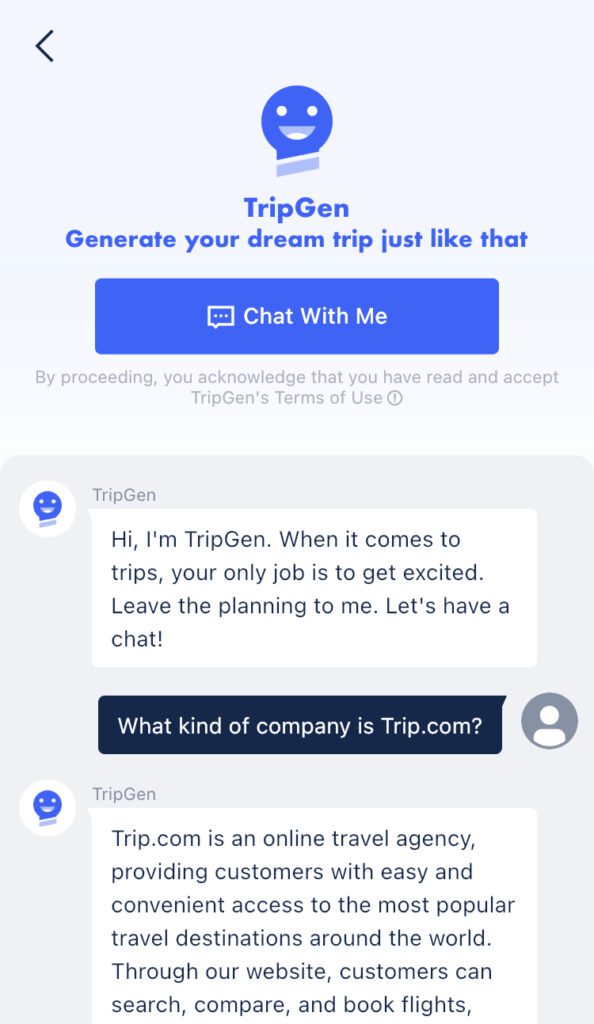Skift Take
Generative AI is far from making a considerable impact in the way travel bookings are made, but Trip.com sees the potential and is starting the hard work now.
Many companies in the travel industry have shared opinions about how generative AI could affect business, but few so far have implemented the technology.
Trip.com, an online travel agency based in Singapore, has been one of the first to add a generative AI chatbot to its platform, with the release recently of TripGen. The chatbot is powered by OpenAI, the company behind ChatGPT.
While the technology is still in the very early stages, the approach at Trip.com is that implementing this type of AI is the next step in enhancing the platform’s existing “comprehensive search” capability, which allows users to book multiple aspects of a trip in one place, according to Amy Wei, senior director of product management for Trip.com Group. The China-based public corporation also owns online travel agencies Skyscanner, Qunar, Travix, and Ctrip.
“We have the one-stop shop strategy, and we are already providing the comprehensive search. It becomes a very natural move for us,” Wei said.
The Trip.com user has been able to search for a particular destination — Disneyland, for example — and be presented with a number of related results, like nearby hotels, car rentals, and tours and attractions.
In the future, generative AI implemented into this process could mean it becomes even simpler for the user, with a prompt for a weekend getaway leading to a detailed itinerary with the ability to compare, book, and pay all in one place. Skift’s CEO, Rafat Ali, has shared his thoughts about how generative AI, in conjunction with other technologies, could shake up travel booking and other areas.
But that vision is far from where the tech exists today.
For now, the TripGen chatbot can be used for trip pre-planning. The TripGen chatbot as it exists is not much different from ChatGPT. The user can ask a question about a travel destination and be presented with a general itinerary, but it’s based on data from 2021 and does not include specifics like hours of operation or website links.

Right now, the Trip.com product team is working on gathering data and combining it with the OpenAI capabilities to make the function more relevant to TripGen users.
“We’ve already started trying to fine tune the data,” Wei said.
TripGen has already been “taught” what it is and that it’s a product of Trip.com. Using questions that users ask the chatbot, one the next steps is to teach TripGen how to answer frequently asked questions and provide information that can be more helpful than just pre-planning suggestions. And, Trip.com is using some of the questions that consumers ask to inform the creation of some of its own marketing materials.
A short-term future version of the TripGen product could provide customer service, and voice search could also be an option.
“They could have a conversation rather than only typing there,” Wei said.
One of the biggest barriers right now is the technology’s limited data.
“The freshness of the information is very important,” Wei said. “That’s the part where we are trying to combine our technology … maybe the flight schedule or the latest hotel rate, to help people further ease their step to booking. We still need to use our engineering resources to make up the part that, currently, OpenAI doesn’t provide to us.”
She thinks the fresh data capability could come soon from the expanded Microsoft-OpenAI partnership. It could also come from Google, based on conversations her team has had with the company about Bard, its generative AI technology.
“They plan to have data freshness maybe by minutes,” Wei said.
While fresh data would enable TripGen’s future step of helping users actually book different aspects of a trip, that step will be a bigger challenge, she said.
“If we consider consumer behavior, they need to compare the price,” she said, adding that they also want to manage other details like length of stay and transportation mileage. A lot of different things come to the decision before the decision making.”
For that reason, until there is a considerable advancement of the software, people may find it most effective to continue booking through existing metasearch or online travel agency websites.
Other big name companies, like Expedia and Hopper, and some startups have shared their thoughts about the role generative AI could have in travel.
Expert opinions also include reservations and concerns about the technology, such as the possibility that small companies could be left out of the equation.
Simon Goddard, chief information officer of travel search and booking technology provider Vibe, is one who warns people not to get too excited too soon.
Goddard believes that the latest developments in generative AI are impressive, but the lack of accuracy, details, personalization, and trust mean the tech is not practical yet. There’s also the question of privacy because the technology will need to hold and analyze large amounts of data in order to progress.
The size and resources of a company will likely determine how successfully the technology can be built upon and rolled out, he said. So if anyone can, large companies like Trip.com have a good chance.
“I think they’re probably going to be the people that are most capable, certainly initially, to get it out,” Goddard said.
The Daily Newsletter
Our daily coverage of the global travel industry. Written by editors and analysts from across Skift’s brands.
Have a confidential tip for Skift? Get in touch
Tags: chatgpt, generative ai, online bookings, online travel agencies, OpenAi, travel booking, travel technology, trip.com, trip.com group
Photo credit: Trip.com is gathering more information to power TripGen, its new generative AI chatbot. Flickr / Flickr
